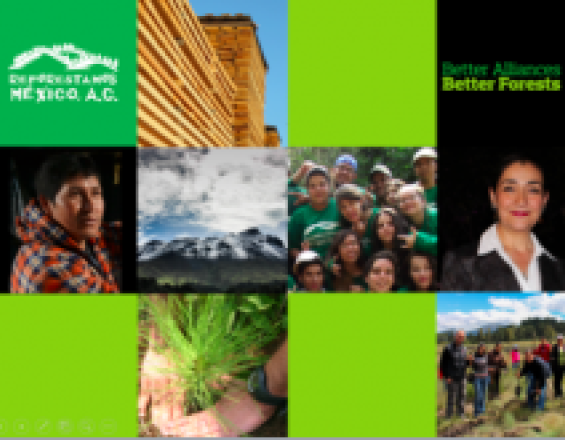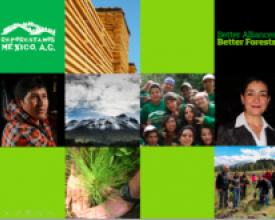
Better Alliances, Better Forests
Solución completa

Better Alliances, Better Forests
Reforestamos Mexico
Reforestamos México developed a solution that allows Natural Protected Areas (NPAs) located near big cities to become a center point that brings alliances, hands and financial resources together in order to plant trees in degraded forests, improve the livelihood of local communities and increase forest awareness among urban people, which derives in better private and public political will to develop initiatives for the benefit of protected and unprotected forests.
Last update: 28 Mar 2019
3915 Views
Contexto
Défis à relever
increase forest awareness among urban people and protection of forests near big cities
Ubicación
Mexico
North America
Procesar
Summary of the process
The union of the four building blocks is achieved through the creation of strategic alliances with various actors involved and/or influencing forests, allowing us to development the necessary actions to achieve sustainability.
Building Blocks
Conservation partnerships with private sector
We search for companies that show an active interest in making socio-environmental investments in the forests of our country. Working with responsible companies allows us to carry out conservation and restoration activities in the forests, and enables companies to engage their employees as volunteers in reforestation or maintenance initiatives. We also engage with the ejidos and commmunities -- the actual owners of the land -- in which we will be working. They participate in restoration activities and act as a local forest brigade to monitor the actions performed by corporate volunteers in order to achieve forest conservation. We have a win-win vision: the NPAs benefit because forests are preserved and restored; companies benefit because they develop a stronger socially responsible strategy; and communities and ejidos win because they find new sources of employment and alternatives that enable the sustainability of their forests.
Enabling factors
The solutions to environmental problems, mainly deforestation, can’t be imposed to forest owners. Communities in Mexico are willing to identify their needs and establish solutions to preserve and restore the forests of Mexico and the private sector is a pretty effective ally. Private sector is willing to invest in reforestation and maintenance events, and also invest in productive projects in order to make them grow.
Lesson learned
Some companies do plant trees, but most them lack policies to avoid buying illegal forest products so they obliviously give illegal loggers incentives to cut trees in the NPA. With our methodology reforestation events are great opportunities to engage employees to integrate forests into the company’s sustainability goals. It also provides opportunities to integrate people from key departments (example: procurement or public affairs) as part of the strategy. The core of our success does not lie in the mere quantity of reforested areas or planted trees, but in the establishment of long-lasting alliances and in the creation of a framework that allows future sustainable initiatives to be developed. Corporate volunteers become forests “spokepersons” in their daily lives.
Engaging youth and community leaders
To involve the forests inhabitants we work with: -Youth leaders: they participate in forest events as guides of the corporate volunteers, teaching and training in environmental issues and creating awareness. Young people help us create a strong environmental culture and promoting sustainability. -Community leaders. forest inhabitants willing to develop entrepreneurial, financial and technical skills based on their own reality in order to implement tailor-made sustainable forest management projects in their communities. This project has a people-centered approach. The process involves 3 stages: (1) work with communities to better understand their context, priorities and capabilities; (2) deliver intensive training sessions on project development and risk assessment; (3) help forest owners communicate their work and learn from other forest communities.
Enabling factors
The social environment that has allowed us to develop this project in Mexico is built around the fact that approximately 80 percent of the forests of Mexico are under the legal jurisdiction of comunidades and ejidos , which coincides with a development, during the last 25 years, of reasonably successful, commercial community forestry enterprises based on timber and non-timber products. Mexico is unique because of the way comunidades and ejidos control forestry. Currently 12 million people inhabit the forests and jungles of Mexico.
Lesson learned
The lack of opportunities in the rural environment means that half the population that inhabit the forests, whether of mixed-race or indigenous, live in poverty. Many people migrate to the United States and urban areas. These are the main reasons that our project has a people-centered approach and why creating a dialogue, opening channels and networking with stakeholders are really important elements to achieve success with this project. We should be clear outlining the responsibilities and the benefits that each party will receive from the beginning of the project to avoid misunderstandings and to be able to create real strong alliances between the parties involved.
Entrepreneurship trainings
The project is innovative because we developed a methodology to embrace entrepreneurial, financial and technical skills in young people based on their own reality through a “hands-on training” method in order to implement tailor-made sustainable forest management projects in their communities. We keep the community informed about their economic environment, and we work together with them in order to enhance their performance and efficiency. When a company joins the program Better Alliances, Better Forests, they don’t only invest in reforestation and maintenance events; they also invest in our program in order to help the communities adopt a business mentality, which will help them have a better future. We help them develop skills to build business plans, organize themselves into production units, and to bring their products to the market. This project has a potential to impact the future based on the fact that our intervention model has proved that forests inhabitants can develop leadership skills and business behaviors in order to create forests value chains.
Enabling factors
Mexico is an emerging economy, with an approximate gross domestic product of US $1.3 trillion. It is among the top 15 economies of the world, with a GDP per capita of around US $11,000 per year. The domestic market requires forestry products for various sectors, construction in particular. Despite the widespread forests and jungles, it is only able to meet a quarter of the demand. The rest is imported, leading to a trade deficit of around US $5 billion, which accounts for around 50% of the total trade deficit.
Lesson learned
Communities often fail to identify opportunities for productive collaboration with other economic actors. Opportunities are often missed, due to the communities having lack of entrepreneurial know-how. Many communities with forestry activities have a high level of technical training, and have the tools and machinery to compete with the major forestry companies, but lack management and entrepreneurship skills. They need support in developing activities that meet the needs of the marketplace. Public policy should strengthen the forestry companies’ internal governance and transparency capacities, to create a favorable business climate, project confidence and attract investment. This project has a potential to impact the future based on the fact that our intervention model has proved that forests inhabitants can develop leadership skills and business behaviors in order to create forests value chains.
Political lobbying and advising
One of our objectives is to create alliances at all levels of the government (federal, state, and municipal). These partnerships allow us to ensure the conservation of forests and the effective monitoring of our environmental, economic and social actions. The active participation of the private sector and the forests inhabitants allows us to obtain the data needed to aid the government in modifying certain public policies as well as demonstrating the importance of these changes.
Enabling factors
The government has allowed communities to use their forests independently through a decentralized land management system. However, communities still need the support of the government and the private sector to reach development. Community forests have also been successful in generating revenue and providing economic development for the communities that own them. 80% of the legal timber in Mexico now originates from communities.
Lesson learned
Rather than regulating economic activity, the existing regulatory framework governing forest exploitation in Mexico has focused on inhibiting it. Unlike farming or stockbreeding, forest exploitation is the only type of land use that requires a permit. Greater integration between the forest and other sectors is a precondition for enhancing the recognition of the economic contributions of forests. Such integration will require major changes in policies and institutional arrangements. Mexico must combat illegality to achieve a better placement of its products, nationally and internationally. The development of our political strategy helped us obtain a strong and formal alliance with the government of the state of Jalisco and the creation of our program of Legal Timber.
Impacts
This program has generated: a) better relationships among actors; b) an increase in private sector investment in forest activities and volunteer participation -151 companies-. The reforestation events tripled in 4 years. We have organized 214 reforestation events gathering 36,737 employees; c) a more sensitive participation of trained young leaders in urban areas; 120 leaders in Mexico City, Guadalajara, Queretaro and Monterrey. Some of them have developed entrepreneurial activities associated with the cause; d) local community employment and sustainable productive projects with entrepreneurial approach to contribute to eradicate poverty in forest communities; e) 814 hectares reforested; f) an increase by 20% to 80% in the percentage of survived trees due to community involvement; g) a stronger ability to influence public policy; h) alliances with local governments in Jalisco, Michoacan, Nuevo Leon, Guanajuato and Yucatan, to promote positive and sustainable forest management; i) a legal timber program is being developed with the state of Jalisco in order to avoid purchasing illegal timber as a pilot to replicate nationally.
Beneficiaries
Local communities
Story
Please contact solution provider for more information



